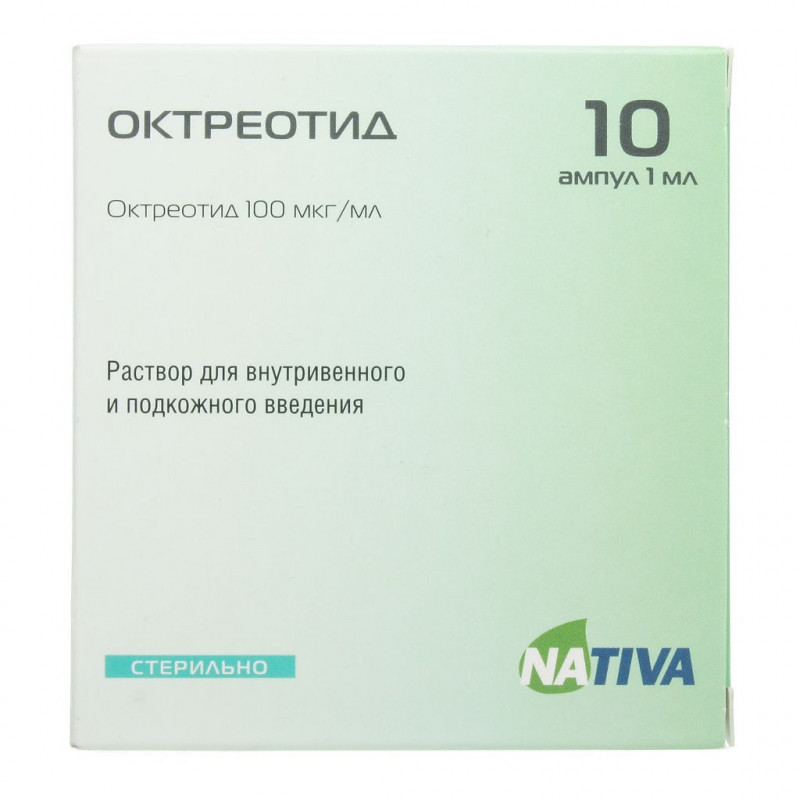



 All payments are encrypted via SSL
All payments are encrypted via SSL
 Full Refund if you haven't received your order
Full Refund if you haven't received your order
Octreotide - injection solution of 0.005 and 0.01%:
1 ml of solution contains octreotide (in the form of free peptide) 50 and 100 mg; in 1 ml ampoules; in a box of 5 or 10 pcs.
Octreotide has pharmacological effects similar to natural somatostatin, but with a significantly longer duration of action. Inhibits pathologically increased secretion of growth hormone, as well as peptides and serotonin produced in the gastroenteropancreatic endocrine system. In patients undergoing operations on the pancreas, using octreotide during and after the operation reduces the frequency of typical postoperative complications (pancreatic fistula, abscesses, and after the operation, abscesses, and after it reduces the frequency of typical postoperative complications (pancreatic fistulas, abscesses, and after the operation, abscesses, and after it, it reduces the frequency of typical postoperative complications (pancreatic fistula, abscesses, and after the operation, abscesses, and it decreases the frequency of typical postoperative complications (pancreatic fistula, abscesses, and after the operation), abscesses, and after it, reduce the frequency of typical postoperative complications (pancreatic fistula, abscesses, and after the operation, abscesses, and after it reduces acute postoperative pancreatitis, etc.).
prevention and treatment of complications after operations on the abdominal organs, stopping bleeding and preventing re-bleeding from esophageal varices in patients with cirrhosis of the liver, treating acute pancreatitis, stopping ulcer bleeding.
Hypersensitivity (including to the components of the drug).With caution: cholelithiasis, diabetes mellitus, pregnancy, lactation.
On the part of the digestive tract organs: possible - anorexia, nausea, vomiting, spastic abdominal pain, flatulence, tension of the abdominal wall, diarrhea, steatorrhea. Although the excretion of fat with feces may increase, there is no indication that long-term treatment with octreotide may lead to the development of malabsorption disorders. In rare cases, there may be phenomena resembling acute intestinal obstruction. Individual cases of acute hepatitis without cholestasis are known, as well as hyperbilirubinemia combined with an increase in ALP, gamma-glutamyltransferase and, to a lesser extent, other transaminases. Long-term use of octreotide can lead to the formation of stones. in the gall bladder. In foreign sources reported rare cases of acute pancreatitis,which developed in the first hours or days of use and disappeared after the abolition of octreotide. On the cardiovascular system: in some cases - arrhythmia, bradycardia.; in rare cases with prolonged treatment, persistent hyperglycemia may develop. Local reactions: pain at the injection site, itching and / or burning, redness, swelling (usually disappear within 15 minutes). Others: allergic reactions, alopecia.
Octreotide injected s / c, in / in. Acute pancreatitis - s / c 100 mcg 3 times a day for 5 days. You can assign up to 1200 mcg / day using intravenous route. Prevention of complications after operations on the pancreas - s / c 100 mcg for 1 hour before laparotomy, then after surgery - 100 mcg 3 times a day for 7 consecutive days To stop bleeding from varicose veins of the esophagus - in / in 25-50 mg / h in the form of continuous infusions for 5 days. Elderly patients do not need to reduce the dose of octreotide. To stop ulcer bleeding - in / at 25 mcg / h in the form of infusions for 5 days.
In diabetic patients receiving insulin, octreotide may reduce the need for insulin.
In the dark place at a temperature of no higher than 20 ° C. Shelf life - 2 years.
